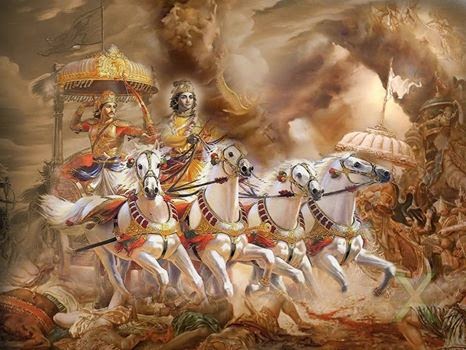Gita : Ch-2. Slo-25.
Srimad Bhagavad-Gita :
Chapter-2. ( Samkya-yogam )
Slokam-25. ( Lord's speach continues...)
avyaktoyamacintyo yam avikaryoyamucyate,
tasmadevam viditvainam nanusocitumarhasi.
ayam = this jeevatma ( soul );
avyaktah = beyond the limits of Indriyas ( sense-organs ), invisible;
acintyah = beyond the limits of (*vishayas ) mind and intelligence, inconceivable;
avikaryah = as it is not matter, unchangeable;
ucyate = ( it is ) said so.
evam viditva = thus, knowing it well;
anusocitum = lament over ( to become sad );
na arhasi = ( killing relatives, teacher, dear friends in the war ) (You Arjuna ) need not to.
It is said that the soul ( jeevatma ) is invisible, inconceivable, immutable, and unchangeable. Knowing this, you should not grieve for the body.
In this slokam Lord Krishna gives additional reasons why one should never grieve for the soul. Because the soul is unmanifest it is not able to be cut or burned like objects which are manifest in this world and being unmanifest it is inconceivable as it is not possible to equate it with the form or nature of anything that one could imagine in the material existence. Being unable to imagine the constitution of the soul indicates it is immutable because it is devoid of any process of modification for example milk transforming to youghurt. Therfore comprehending the nature and quality of the soul as enunciated above one should not be under the delusion of lamentation.
It might be questioned that if the Supreme Lord is all pervading why is He not visible? The reason is because He is inconceivable. It may be further queried how does He appear so endowed? Because of His power of remaining unthinkable; but this power does not come from any outside source but is contained solely within Himself. Whatever forms He exhibits in all these He alone manifests fully. To emphasise words like enam and ayam indicating the eternal soul are used in different contexts. In the case of the living entities it is to show that their eternal soul has qualitatively the same essence and attributes as the Supreme Lord but infinitesimal quantitatively. This is further confirmed in various Vedic scriptures.
Analysing the subject further it is known as avyaktah or unmanifest not being able to be perceived by the eye or any other of the senses, acintyah or inconceivable not being able to be perceived by the mind. The word avikaryah meaning unchangeable is in the sense of not being modifiable by any of the organs of action. The word ucyate meaning it is said thus indicates that authoritative testimony corroborates the validity of the immortal soul being eternal and everlasting as given in the previous verse. The word tasmat means therefore and by its use it is shown that this is a concluding statement.
The word avyaktah means invisible or imperceivable this is because the eternal soul being totally transcendental to the material existence cannot be practically examined as can objects which possess qualities of a physical nature.
The word acintyah means inconceivable because the eternal soul is impossible to perceive by the mind and the senses being in every way transcendental to the material substratum which is what the consciousness of the living entities base their understanding on. The eternal soul differs from all other existences and levels of existence is in transcendence. Therefore it is avikaryah unchangeable and immutable. The Supreme Lord Krishna instructs that by knowing the eternal soul to be immortal there is no cause for grief.
It is said that the soul is invisible, inconceivable, immutable, and unchangeable. Knowing this, you should not grieve for the body.
As described previously, the magnitude of the soul is so small for our material calculation that he cannot be seen even by the most powerful microscope; therefore, he is invisible. As far as the soul's existence is concerned, no one can establish his existence experimentally beyond the proof of śruti or Vedic wisdom. We have to accept this truth, because there is no other source of understanding the existence of the soul, although it is a fact by perception. There are many things we have to accept solely on grounds of superior authority. No one can deny the existence of his father, based upon the authority of his mother. There is no other source of understanding the identity of the father except by the authority of the mother. Similarly, there is no other source of understanding the soul except by studying the Vedas. In other words, the soul is inconceivable by human experimental knowledge. The soul is consciousness and conscious—that also is the statement of the Vedas, and we have to accept that. Unlike the bodily changes, there is no change in the soul. As eternally unchangeable, the soul remains atomic in comparison to the infinite Supreme Soul. The Supreme Soul is infinite, and the atomic soul is infinitesimal. Therefore, the infinitesimal soul, being unchangeable, can never become equal to the infinite soul, or the Supreme Personality of Godhead. This concept is repeated in the Vedas in different ways just to confirm the stability of the conception of the soul. Repetition of something is necessary in order that we understand the matter thoroughly without error.
To be continued ...





Comments
Post a Comment